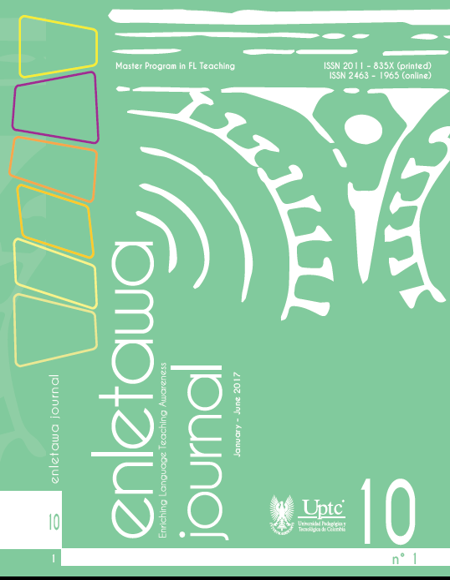Re-alimentación: Comprensión de estrategias y su impacto en contextos de aprendizaje y enseñanza del Inglés como lengua extranjera

Resumen
La re-alimentación es una herramienta poderosa que tiene una influencia significativa en el éxito de los estudiantes. Esta influencia en los procesos de aprendizaje y de enseñanza han sido apropiadamente documentados, sin embargo existen muy pocas investigaciones con referencia al impacto que tienen diferentes estrategias de retroalimentación en el aprendizaje de una lenguaje extranjera. Este artículo busca proporcionar una contribución teórica y práctica dirigida al entendimiento del impacto que tiene la retroalimentación en los procesos de enseñanza y aprendizaje de una lengua extranjera en un estudio de caso conducido en una institución privada en Bogotá, Colombia. La evidencia reunida demuestra que el uso de estas estrategias de retroalimentación y la manera en que se proveen influyen en su efectividad. Tres principales estrategias fueron observadas y analizadas: Retroalimentación correctiva, emocional y de desarrollo. Esta investigación concluye con una sugerencia que indica la necesidad de la enseñanza de retroalimentación como una política explicita en programas educativos que forman maestros en el país.
Palabras clave
Re-alimentación, re-alimentación correctiva en inglés como lengua extranjera, re-alimentación motivacional, re-alimentación de desarrollo
Citas
Bell, A. and Orgnero, C. (2011). Brainbased cognitive processes that underlie feedback between adult students and instructors. Proceedings of the Education Research Conference and Canadian Association for the Study of Adult Education Joint Meeting, Toronto, Ontario, Canada.
Black, P. and William, D. (1998). Assessment and classroom learning. Assessment in Education, 7–74.
Boksem, M., Van der Helden, J., and Blom, J. (2009). The Importance of Failure: Feedback Related Negativity Predicts Motor Learning Efficiency. Neuroimage, 47, S179.
Böhm, R. and Rockenbach, B. (2013). The inter-group comparison–intra-group cooperation hypothesis: comparisons between groups increase efficiency in public goods provision. PloS one, 8(2), e56152.
Boud, D. (1995). Enhancing learning through self-assessment, London: Kogan Page
Boud, D. (2000). Sustainable assessment: rethinking assessment for the learning society. Studies in Continuing Education. 22 (2), 151-167.
Butler, D. and Winne, P. (1995). Feedback and Self-Regulated Learning: A Theoretical Synthesis. Review of educational research, 65, 3245-281.
Cheng, H. and Dörnyei, Z. (2007). The use of motivational strategies in language instruction: The case of EFL teaching in Taiwan. International Journal of Innovation in Language Learning and Teaching, 1(1), 153-174.
Cohen, G., Steele, C., and Ross, L. (1999). The mentor’s dilemma: Providing critical feedback across the racial divide. Personality and Social Psychology Bulletin, 25(10), 13021318.
Dulay, H., Burt, M., and Krashen, S. (1982). Language Two, Oxford University Press, New York.
Espinosa, D. (2017). Vlogging Through Virtual Lessons: Enhancing Speaking Skills on a EFL Blended Learning Environment. Universidad Externado de Colombia. Non-published thesis article.
Flege, J. (1995). Second-language speech learning: Theory, findings and problems”, in STRANGE, W. (Ed.) Speech Perception and Linguistic Experience: Theoretical and Methodological Issues in Cross-Language Speech Research. Timonium, MD: York
Freeman, R. E. (1999). Divergent stakeholder theory. Academy of management review, 24(2), 233-236.
Hattie, J. and Timperley, H. (2007) The Power of Feedback. Review of Educational Research, 77 (1), 81-112.
Hattie, J. (2003). Teachers Make a Difference, what is the research evidence?
Hyland, K., and Hyland, F. (2006). Feedback on second language students’ writing. Language teaching, 39(02), 83-101.
Ismail, J. (1991). Language exposure and second language learning. The English Teacher, 20, 20-31.
Ivanic, R., Clark, R. and Rimmershaw, R. (2000). What am I supposed to make of this? The messages conveyed to students by tutors’ written comments. In M.R.
Jungmi, K. (2003). A Study of negotiation of meaning in NNS-NNS interactions – focusing on synchronous CMC. Paper presented at the 8th conference of Pan-Pacific Association of Applied Linguistics. Japan.
Ketsman, O. (2012). Expectations in the foreign language classrooms: A case study. The Qualitative Report, 17(53), 1.
Kraback, A. (2014). Developmental feedback. California State University. Retrieved from: https://www.csustan. edu/writing-center/faculty-information/developmental-feedback
Kumaravadivelu, B. (1986). Second Languages: a cross-linguistic perspective. Applied Psycholinguistics, 7(2), 157.
Loewen, S. (2012). The role of feedback. The Routledge handbook of second language acquisition, 442-460.
Lightbown, P., and Spada, N. (2006). How languages are learned. Oxford University Press.
Lyster, R. (2002). Negotiation in immersion teacher-student integration. Educational research. Department of Integrated Studies in Education, McGill University found it on: http:// personnel.mcgill.ca/files/roy.lyster/ Lyster2002_IJER.pdf
Nicol, D. and Macfarlane-Dick, D. (2006) Formative assessment and self-regulated learning: a model and seven principles of good feedback practice. Studies in Higher Education. 31 (2), 2006. DOI: 10.1080/03075070600572090.
Poulos, A. and Mahony, M. J. (2008). Effectiveness of feedback: The students’ perspective. Assessment & Evaluation in Higher Education, 33(2), 143-154.
Sadler, D. (1989). Formative assessment and the design of instructional systems. Instructional science, 18(2), 119144.
Sadler, D. (2010). Beyond feedback: Developing student capability in complex appraisal. Assessment and Evaluation in Higher Education, 35(5), 535550.
Tomlinson, B. (2012). State-of-the-art article: Materials development for language learning and teaching. Language Teaching, 45(2), 143-179.
William, M. and Burden, R., 2009. Psychology for language teachers: a social constructivist approach. Cambridge: Cambridge University Press.
Willis, J. (1996). A flexible framework for task-based learning. Challenge and change in language teaching, 52-62.
Yin, R. (1994). Case Study Research: Design and methods. California, United States.
Yin, R. (2003). Case Study Research: Design and methods. California, United States Yin, R. (2012). Case Study Methods. American Psychological Association. Washington DC, United States.
Yorke, M. (2003). Formative assessment in higher education: Moves towards theory and the enhancement of pedagogic practice. Higher education, 45(4), 477-501.
Zimmerman, B. (1989). Models of selfregulated learning and academic achievement. In Self-regulated learning and academic achievement. Springer New York.
Zainal, Z. (2007). Case study as a research method. Jurnal Kemanusiaan, (9), 1-6.